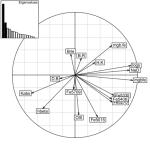Evolutionary multivariate classification for galaxies
2 : Institut de Planétologie et d'Astrophysique de Grenoble
(IPAG)
CNRS : UMR5274, Université Joseph Fourier - Grenoble I
The large amount of data on galaxies, up to higher and higher redshifts, asks for sophisticated statistical approaches to build adequate classifications. Multivariate cluster analyses, that compare objects for their global similarities, are still confidential in astrophysics, probably because their results are somewhat difficult to interpret. We believe that the missing key is the unavoidable characteristics in our Universe: evolution. We have developed an approach, known as astrocladistics, based on the evolutionary nature of both galaxies and their properties. It is largely inspired from phylogenetics systematics and bioinformatics. We try to gather objects according to their “histories” and establish an evolutionary scenario among groups of objects. Interestingly, ordering objects on a tree or a split-network requires the exploration of the structures in the parameter space, implying de facto some dimensionality reduction. The conjugate use of cladistics, cluster analyses with K-means partitioning algorithms, and Minimum Contradiction Analyses, provides a complete tool to understand the discriminant power of the parameters and to assess the robustness of the classification by comparing the three different techniques.


